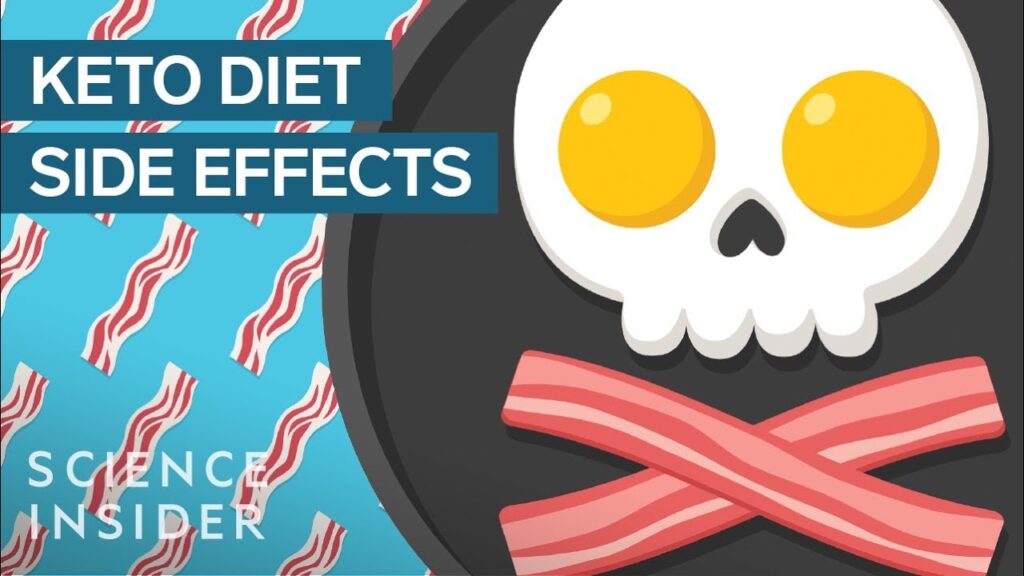The ketogenic, or keto, diet has been hailed for its remarkable effects on weight loss and energy levels. Propelling it to the forefront of dietary trends. However, like any significant dietary adjustment. The shift to a high-fat, low-carbohydrate regime can bring about various side effects. This article explores the common side effects associated with the keto diet, their underlying causes, and how they can be managed or mitigated.
Common Side Effects of the Keto Diet

Keto Flu
One of the most frequently discussed side effects of the keto diet is the “keto flu.” A term coined to describe the flu-like symptoms that many experience during the initial stages of the diet. Symptoms can include fatigue, headache, dizziness, irritability, nausea, and muscle soreness. These symptoms typically arise as the body transitions from glucose to fat as its primary energy source and are temporary, generally subsiding within a few days to a couple of weeks.
Digestive Issues
As the body adjusts to a higher fat intake and drastically reduced carbohydrates, digestive issues such as constipation or diarrhea can occur. These issues are often due to a lack of fiber in the diet, as many fiber-rich foods like fruits and whole grains are cut out. Incorporating low-carb, high-fiber vegetables and possibly fiber supplements can help alleviate these symptoms.
Increased Cholesterol Levels
Some individuals on the keto diet may experience elevated cholesterol and triglyceride levels, which could be a concern for heart health. This effect varies by individual, as some people may see an improvement in their lipid profiles. Regular monitoring of cholesterol levels is recommended to ensure they remain within a healthy range.
Nutrient Deficiencies
The restrictive nature of the keto diet can lead to deficiencies in certain vitamins and minerals, Particularly those found in fruits, vegetables, and grains, such as vitamin C, magnesium, and potassium. These deficiencies can lead to longer-term health issues if not addressed. Taking a well-rounded multivitamin or incorporating keto-friendly sources of these nutrients can help mitigate this risk.
Dehydration and Electrolyte Imbalances
Ketosis leads to a decrease in insulin levels which causes the kidneys to release more sodium and water. This can lead to dehydration and an imbalance of electrolytes (sodium, potassium, magnesium). Symptoms of electrolyte imbalance include cramps, muscle spasms, and irregular heartbeats. Drinking plenty of water and consuming electrolytes through food or supplements can help prevent these issues.
Decreased Bone Density
Preliminary research suggests that long-term adherence to the keto diet could potentially lead to decreased bone density. This may be due to reduced intake of fruits and vegetables that provide nutrients essential for bone health, such as calcium and vitamin K. Ensuring adequate intake of these nutrients is crucial for maintaining bone strength.
Managing Side Effects
To mitigate the side effects of the keto diet, it is important to approach the diet with a plan:
- Hydration and Electrolytes: Increase water intake and consider electrolyte supplements.
- Balanced Nutrition: Focus on incorporating a variety of foods that are keto-friendly yet rich in nutrients, such as leafy greens, fatty fish, and nuts.
- Gradual Transition: Ease into the keto diet slowly to allow the body time to adjust, which can reduce the severity of keto flu symptoms.
- Medical Supervision: Regular check-ups with a healthcare provider to monitor blood levels and overall health, especially for those with pre-existing conditions.
Conclusion
While the keto diet can offer significant health benefits, it is not without its side effects. Understanding these side effects and preparing to manage them can make the transition smoother and safer. As with any dietary change, it’s advisable to consult with healthcare professionals to ensure that the diet is appropriate for your individual health needs and circumstances. This careful approach can help maximize the benefits of the keto diet while minimizing potential risks.

